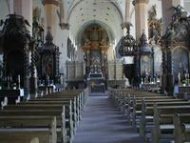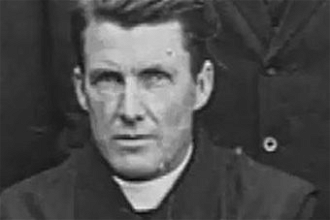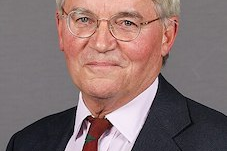Text: Cardinal Brady at German celebrations in honour of St Oliver Plunkett

Kloster Lamspringe
Cardinal Seán Brady, Archbishop of Armagh and Primate of All Ireland gave the following address today at celebrations in honour of St Oliver Plunkett in Kloster Lamspring, the former Benedictine Abbey for exiled Irish and English Catholics in the Diocese of Hildesheim, Germany...
In this Year of Faith, the Church invites us to look again to the example of the Saints associated with our local and national Churches. They can serve as a source of renewal for our own faith. I take this opportunity to thank the German people and Government for their solidarity with Ireland in the recent global economic crisis ... we owe Germany a great debt of gratitude for your commitment to the principle of solidarity
I am very grateful today for the invitation of Bishop Norbert Trelle to come to the diocese of Hildesheim for the annual celebrations in honour of Saint Oliver Plunkett, the martyred Archbishop of Armagh.
I thank Mayor Wolfgang Pletz for meeting me and welcoming me so cordially. I thank too Father Konrad Sindermann, Parish Priest of Lamspringe and Mr Hans Werner Kindervater who organises this annual pilgrimage in honour of Saint Oliver Plunkett. I congratulate all of you on your devotion to Saint Oliver, especially those who visited his shrine in Drogheda in July 2011.
I am happy to be accompanied here on this pilgrimage by Mr Tommy Burns. Tommy lives in Drogheda where the National Shrine of Saint Oliver is located. Tommy is Chairman of Saint Oliver Plunkett for Peace and Reconciliation, which is a crusade to promote prayer to Saint Oliver in these words:
Glorious Martyr, Saint Oliver,
who willingly gave your life for your faith,
help us also to be strong in faith.
So it is with delight and a deep sense of gratitude that I come to this historic town of Lamspringe in this Year of Faith. I know that the foundation of the first religious house at Lamspringe is usually dated at 847. But the links of faith which unite Germany and Ireland go back much farther. Saint Kilian - a native of Mullagh in Ireland, became Bishop of Wurzburg and died a martyr's death in 689. Each year pilgrimages come back and forth, from Germany to Ireland and from Ireland to Germany to commemorate his memory and celebrate his life.
Tomorrow I hope to celebrate Holy Mass in the Basilica of St Gotthard in Hildesheim. I note that Gotthard spent some time in Salzburg before coming to Hildesheim. Virgilius, an Irish monk became Bishop of Salzburg in the 8th century and died there around 784 AD.
So it is a great joy to be here with you on this site of the historic and beautiful Abbey of Lamspringe. If these walls could sing they would ring out with the hymns and psalms that have filled this place with a rhythm of prayer and praise since 847 AD, first in the tradition of the Augustinian Canonesses and then in the tradition of the Benedictine monks. The beautiful gardens too remind us of the contemplation and honest labour - the ora et labora - that have sanctified this place and make it even today a potent symbol of the harmony between grace and nature that is the hallmark of Christian holiness, of a life rooted in simplicity, humility and prayer.
It is a privilege to visit the birthplace of the great twelfth century Psalter of Saint Alban, now stored in the Cathedral library in Hildesheim. I was delighted to see there one of the most comprehensive and highly decorated monastic psalters of its time.
One of the abiding memories of my youth was the recitation of the family rosary. At the end of the rosary my late father would always recite three Hail Mary's for the Canonisation of Blessed Oliver Plunkett. Oliver Plunkett was born in County Meath about 30 kilometres from my native place. I have always looked to him for inspiration, especially when I too was sent to Rome to the Irish College to continue my studies.
After being ordained a priest, on my return to my native diocese, I was involved in the crusade for the canonization in its final stages. I was immensely pleased to be in Saint Peter's Basilica on 11 October 1975 for his canonization by Pope Paul and I am very pleased to be here this evening.
Oliver Plunkett was at first buried in the churchyard of Saint Giles, near Newgate prison. As many of you know, in prison Oliver met a priest called Dom Maurus Corker. A convert to the faith from Yorkshire, he had become a Benedictine here in this Abbey of Lamspringe. Dom Corker was arrested on his return to England, and sentenced for alleged involvement in the Papish plot.
Eventually he was reprieved and released from prison in 1683. He then had the body of Saint Oliver exhumed and he brought all the relics here to this Benedictine Monastery at Lamspringe. They rested here for more than two centuries in a special shrine erected in the abbey church in Lamspringe. In 1883 the relics were transferred to Downside Abbey in England.
I wish to take this opportunity to thank you - the bishop and people of this Diocese of Hildesheim for giving hospitality to the mortal remains of Saint Oliver Plunkett. In life, Oliver had visited Germany on his way back to Ireland from Rome. He passed through Munich, Augsburg, Nurnberg, Wurzburg, and Cologne. He sailed down the Rhine to Holland; from there he went to Belgium and Ghent where he was ordained bishop. I wish to thank you for keeping the memory of Saint Oliver Plunkett fresh and vivid.
Like Saint Oliver I spent some lovely years of my life in Rome, first as a seminarian and a student priest and later as a member of the staff of the Irish College which is the Irish National Seminary. From1657 to 1669 Oliver was on the staff of the Collegio de Propaganda Fide. He had very happy memories of this era in his life and this profound love of Rome and of the Roman Pontiff sustained him for the rest of his life.
The Gospel which we have just heard is that of the Good Shepherd. Jesus told His disciples that He is the Good Shepherd who lays down his life for His sheep. It was chosen for this evening's Mass because those words, without doubt, inspired Saint Oliver Plunkett. They inspired him to swap the security and serenity of his teaching post in the College of Propaganda Fide in Rome for the difficult dangerous life of Archbishop of Armagh in an Ireland that was being persecuted for its religious faith.
Before he left Rome, Oliver was told by a Polish priest Chaplain at the hospital where he served the sick and poor that he knew that he was going back to die for his faith. Oliver replied that he was not worthy of such an honour and he asked for prayers that he be made worthy.
Oliver Plunkett did not run away from the challenges presented to him. I am sure that he could have found many good reasons to persuade his superiors in Rome to allow him to continue there. After all, he was preparing missionaries for the whole vast missionary world, answering the needs of the Universal Church. He could have protested that he was ill prepared - having left Ireland at the young age of 22 years and being absent from Ireland for another 22 years. But no, Oliver indicated that he was willing to allow his name to go forward to be considered.
In this Year of Faith, the Church invites us to look again to the example of the Saints associated with our local and national Churches. They can serve as a source of renewal for our own faith. As in the era of Benedict and Oliver Plunkett, the journey of the Church is passing through a time in which the light of faith and reason has been dimmed by wounds of sin and division.
The recent Synod has reminded us: 'Jesus opens the doors [of faith] anew for us so that, without fear, we can lovingly embrace the wounds of the Church and of the world.' Saint Oliver Plunkett shows us how to lovingly embrace the wounds of the Church and the world in our day.
He is the kind of credible witness to the Gospel that our world, and especially the young people, so earnestly desire. He is an example of the Good Shepherd who gives His life for His sheep. The shepherd who is immersed in the day to day lives of his people and who accompanies them on their journey of faith from within. He is for us an icon of God's mercy, someone who radiates forgiveness and joy in the midst of setback and betrayal. He is a living witness to the charter of mercy and love set out in our first reading from the Letter of Saint Peter as the hallmark of every Christian life.
Like Saint Benedict, Oliver had a particular gift and concern for building up unity. From his closeness to Christ he radiated sympathy, a love of the poor, a tender heart and a humble mind. He did not return evil for evil. In the words of our reading, it is better to suffer for doing right, if that is God's will, than for doing wrong. Oliver was zealous for what is right. But as we have heard, even when he was falsely accused and faced death he had no fear. With gentleness and reverence he gave an account of the hope that was in him. A hope, firmly rooted, in Christ's certain victory over all evil and sin.
In this we can say that the life of Saint Oliver Plunkett continues to be of particular significance to the Church of our day as a witness to the Christian vocation of forgiveness, mercy and of building unity and peace.
Speaking to the young people in Rio only a few weeks ago, our Holy Father Pope Francis, spoke of the urgent task of building a renewed humanity in harmony and solidarity. As we gather on this pilgrimage of faith let us be inspired by the example of this great man of peace and reconciliation, Saint Oliver Plunkett whose life and witness spanned the boundaries of Europe and like Saint Benedict urges us to be instruments of unity, forgiveness and peace.
The Benedictine monks of this historic abbey showed incredible hospitality and care for the martyred remains and for the memory of Saint Oliver. You keep that memory alive today. In thanking you for generosity and faith, let us also be inspired together by the great act of solidarity and friendship shown by Dom Corker to reach out to those who in our time suffer persecution for their Christian faith across the world, particularly today in Syria and in other parts of the Middle East.
It is worthy of note that our pilgrimage also takes place in the year that marks the fiftieth anniversary of the publication of Pacem In Terris, the great encyclical on Peace on the Earth written by Pope John XXIII. It is here that the Church set out in the context of the modern world the basis and hope for a more just world order. It is an order - marked by an active solidarity among nations and the pursuit of the global common good. At the heart of this renewed vision of human society is an acknowledgement that more and more people are now convinced that any disputes between peoples and nations 'must be resolved by negotiation and agreement, and not by recourse to arms' (PT, n.126). In the words of Pope Francis to a group of Japanese school children who recently spoke to him of their hopes for world peace: "Dialogue is what brings peace", he said. "If we go out to encounter other people, other cultures, other religions, we grow and we begin that beautiful adventure called dialogue. Peace is impossible without dialogue."
Speaking from my experience of the search for peace in Northern Ireland, I can certainly echo the truth of these words.
Pacem in Terris also speaks of the importance of intra-national solidarity in the economic sphere as the key to a sustainable and just development of universal prosperity. Christianity is lived out in very practical terms. The unity, solidarity, sympathy spoken of in our first reading has profound implications for the management of the international economy as well as for our day to day lives as Christians.
The recent global economic crisis has put before us a stark choice about how to structure the world economy of the future in a way that places the dignity of every person and the global common good at the centre of a new global economic model. In the most dramatic moments of the recent economic crisis, fundamental choices about solidarity versus national isolation had to be made. This happened, not least in the context of the European commitment to the principle of economic union and the search for greater solidarity as the basis for a more just, sustainable and peaceful Europe.
As a citizen of Ireland, recalling today the hospitality and respect shown by the people of this part of Germany to a great Irish artisan of reconciliation and peace between peoples, Saint Oliver Plunkett, I take this opportunity to thank the German people and Government for your solidarity with Ireland in the recent global economic crisis. With many other countries of Europe at this time, we owe Germany a great debt of gratitude for your commitment to the principle of solidarity in a dramatic moment of economic crisis. Isolation and self-interest alone could so easily have become the dominant motives in decisions taken. Fortunately, this did not happen.
We are at a defining moment in the world's search for a more just, sustainable and person-centred global economy. There is no other way to this better future than the path of deeper solidarity, sympathy and mutual commitment to each other's development in the global economic, political and cultural sphere. This is certainly the path to which our feet are directed by the example of such a new world order, based on unity, peace and solidarity as the great Europeans: Saint Columbanus, Saint Benedict and the early missionary saints of Ireland.
Saint Benedict once spoke of how he saw the whole world gathered as though into one single ray of light. The task of building reconciliation and unity remains urgent in our world. Working for that peace is an essential part of the challenge and journey of renewing our faith. As Pope Benedict has reminded us in announcing this Year of Faith, the world is in urgent need of authentic witnesses to the transforming power of God's merciful love. By faith, he goes on to say, the martyrs gave their lives, bearing witness to the truth of the Gospel that had transformed them and made them capable of attaining to the greatest gift of love: the forgiveness of their persecutors.
By faith, countless Christians have promoted action for justice so as to put into practice the word of the Lord, who came to proclaim deliverance from oppression and a year of favour for all (cf. Lk 4:18-19). By faith, across the centuries, men and women of all ages have confessed the beauty of following the Lord Jesus wherever they were called to bear witness to the fact that they were Christian and bearers of peace: in the family, in the workplace, in public life, in the exercise of the charismas and ministries to which they were called. At Tyburn Saint Oliver Plunkett forgave those who betrayed him and those who brought about his death.
By faith, we too live: in making our pilgrimage of faith today to this place of veneration of an apostle of forgiveness, peace and reconciliation, Saint Oliver Plunkett, may we too become instruments of the civilisation of justice, peace and love in our world. May we become bearers of the warmth of hope to all humankind that flows from the tender and merciful heart of God, in Jesus Christ our Lord.
I end with the concluding two verses of the Saint Oliver Plunkett for Peace and Reconciliation daily prayer for peace:
May we be loyal like you to the see of Peter.
By your intercession and example
may all hatred and bitterness
be banished from the hearts of Irish men and women.
May the peace of Christ reign in our hearts,
as it did in your heart,
Even at the moment of your death.
Pray for us and for Ireland.
AMEN





















